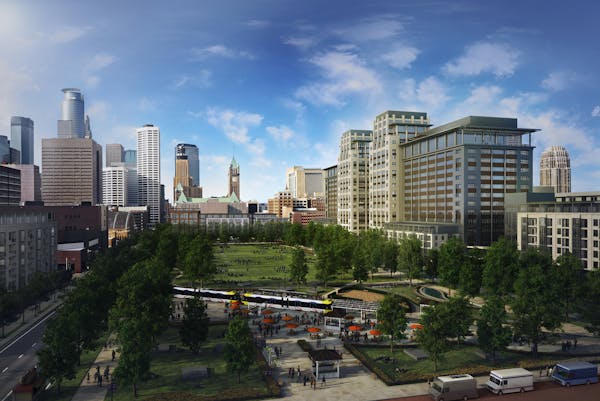Ground is broken, the budget stars have aligned, and the disassembly and demolition will soon commence at the Metrodome to make room for the new Vikings stadium.
Now for the 64,000-seat question: What to do with those blue plastic folding bleacher chairs that, along with the rears planted in them, were witness to more than three decades of Minnesota sports history?
About 70 schools, colleges and nonprofits would like them, preferably in 200- to 300-seat chunks — not so much for their souvenir value, but because new bleacher seats can set an organization back $150 apiece.
But prying apart thousands of chairs and handing them intact to deserving organizations would be neither simple nor cheap, Minnesota Sports Facilities Authority Chairwoman Michele Kelm-Helgen told legislators Thursday.
"It's going to be a fairly major challenge," Kelm-Helgen said at a hearing for the Legislative Commission on Minnesota Sports Facilities on Thursday. "Obviously we want to be a resource for those schools and community groups, but here's the issue we're confronted with: We need to be very clear what it is they're getting."
Dome demolition is expected to begin right after the Vikings' final home game Dec. 29, to make way for construction of a $975 million replacement that is scheduled to open for the 2016 NFL season. In the meantime, contractors are planning to empty the Dome of its contents — including the seats.
But disposing of those seats is posing a conundrum for stadium officials. Some seats will be auctioned, but how many remains uncertain as officials calculate how to remove and separate them cheaply.
"It's become a stumbling block for us for us to figure out what the cost is going to be and what people can reasonably pay," Kelm-Helgen said.
Most individuals who contacted the authority have asked for seats or dirt, including the River Falls (Wis.) Baseball Council, which is requesting "exactly 293 seats" for a townball-style ballpark under construction.
That's not so easy. Dome seats are bolted directly onto concrete slabs, with no base, Kelm Helgen said. They come in long rows, making removal and separation expensive. Mortenson Construction, which is overseeing the stadium project, puts chair removal costs at $48 per seat. At that rate, the tab for the 20,000 seats requested by nonprofits could top $960,000.
"Our authority can't absorb a million-dollar cost to remove chairs," Kelm-Helgen said. She said it's doubtful whether most nonprofits could afford even the $48 for used seats.
Commission co-chair Sen. Bobby Joe Champion, DFL-Minneapolis, asked whether interested groups could remove the chairs themselves. Kelm-Helgen said that's unlikely because of insurance and liability issues, union rules and the difficulty in separating them.
Removal is "not just unbolting a few things," she said. "It's a very significant process."
Champion said he hopes a cost-effective solution can be achieved. "We wouldn't want to foresee all those wonderful chairs that have great memories just go to waste and end up in some landfill." he said.
Kelm-Helgen's meeting with legislators was the first since Tuesday's groundbreaking. In the meantime, work will begin in earnest on the new stadium in February. In July, a huge tower crane — one of only three in the world, Kelm-Helgen said, will arrive in 100 truckloads, be assembled on site, then hoist the steel that will form the framework of the stadium.
The project got on track after the Vikings fronted an extra $41 million late last month to retain features originally desired for the stadium. Kelm-Helgen told legislators that the team may be able to recoup some of that from the construction contingency budget of $30 million, but that contingency fund also may be used to restore previously eliminated items, such as an additional escalator and freight elevator.
Vikings Vice President of Public Affairs Lester Bagley said the organization anticipates that the money will be spent on the project itself.
"There may be some tough decisions to make over the next 30 months of construction, in whether or not we invest additional funds to make sure we have the things in the building that we need," he said.
Abby Simons • 651-925-5043
Officials ID teen who died after jumping into southwestern Minnesota lake to retrieve canoe oar
Charges: Man fatally stabbed woman in neck outside downtown Duluth bar after closing time
Charges: Man posed as woman in video chats, lured men into sexually exploiting youngest of children

Fired South High math teacher accuses Minneapolis Public Schools management of 'cancerous rot'

